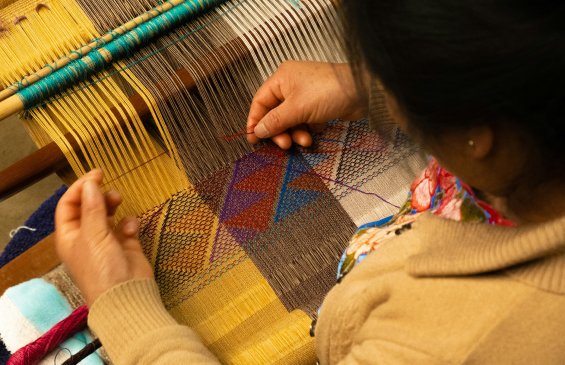Experiential Learning Allows Learners to Support Slow Fashion and Indigenous Designers
 Photo by ALAN DE LA CRUZ on Unsplash.
Photo by ALAN DE LA CRUZ on Unsplash.
December 13, 2023
You have probably heard the term “fast fashion,” but you might not have heard of “slow fashion.” Slow fashion is an approach to producing clothing which takes into consideration all aspects of the supply chain with the aim of respecting people, the environment, and animals. This also means spending more time on the design process, ensuring that each piece of apparel is quality made.
Indigenous fashion can often be described as slow fashion because it often requires using extensive craftsmanship and intricate designs, materials, and beading or embroidery. The time and resources required as well as the uniqueness of each individual piece often make them expensive to produce and sell.
Now, there’s a way for Chang School learners to support the slow fashion movement and Indigenous fashion designers. The Chang School has partnered with Indigenous Fashion Arts (IFA) to launch an Indigenous fashion rental marketplace in April 2024, ahead of its May 31 Gala event and 2024 Festival. IFA is a Toronto non-profit arts organization that is Indigenous-led and supports Indigenous people and communities working in fashion, craft, and textiles.
Chang School learners can take part in an experiential learning opportunity through three courses in the certificate’s curriculum that will allow them to take part in designing, developing, and maintaining the marketplace.
Jennifer Pilkington, Academic Program Coordinator for the Certificate in Fashion Innovation, says the courses, which are currently being offered through to 2025, will offer learners an opportunity to work with unique real-world business case studies, like the IFA rental marketplace, linking theory with practical application.
“Students will learn about, contribute, and support the IFA rental marketplace through dedicated course work,” she says. “The courses provide insights into sustainable and innovative practices, which are essential for designers focusing on unique, culturally significant, and eco-friendly fashion. They also offer networking opportunities and exposure to diverse perspectives in fashion, which can be invaluable for independent and Indigenous brand designers.”
A Sustainable Approach
As Indigenous fashion designers create pieces that are not mass produced and are of high quality, they tend to be more sustainably-minded than their commercial fashion counterparts. The marketplace model lends itself to a sustainable direct-to-consumer (DTC) fashion model. It also reduces consumption by eliminating one-time-use purchases and converting them into multi-use rentals, which extends the lifespan of the product and keeps it out of landfills.
Jennifer adds that in Indigenous fashion there’s a tradition of only taking what you need. “You don’t see as much mass production. There’s also a lot of made-to-order and custom work for clients being done that serve that same sort of principle. There’s not the same obligation (as commercial fashion retailers) to follow that intense fashion schedule. There can be more of a commitment to community and work-life balance.”
Partnership in Action
Chang School learners are already involved in the planning phases for the marketplace launching next spring. Those who are enrolled this fall in CFSN 105 - Fashion Systems I had the opportunity to conduct research on requirements, and planned the marketplace rental system. Learners are also creating branding and messaging as well as identifying inventory needs and creating a designer selection process.
For the upcoming Winter 2024 term, learners enrolled in CDFI 100 - Events and Digital Experiences will work in partnership with IFA to create the digital shopping experience and in-person pop-up. This includes landing page design, supporting digital posts on social media and IFA websites, and creating product pages.
After the IFA Festival in 2024, the rental store will be managed by future CDFI 300 - Fashion Research and Analytics learners, who will complete sales and market analysis, trend research, and suggest future designer and inventory additions. Learners will also support the maintenance and update of the marketplace.
While these courses are part of the Certificate in Fashion Innovation, they stand alone as valuable experiential learning opportunities, too. They delve into critical topics like supply chain management and consumer feedback loops (CFSN 105 - Fashion Systems I), data-driven decision making, and trend and consumer forecasting (CDFI 300 - Fashion Research and Analytics), and the creation of immersive, innovative events and experiences (CDFI 100 - Events and Digital Experiences). Each course explores where the opportunity and challenges are today and in the future in each of those job functional areas.
Jennifer says the fashion industry increasingly relies on cross disciplinary professionals in technology, community and activism, as well as legal and retail management to name a few.
